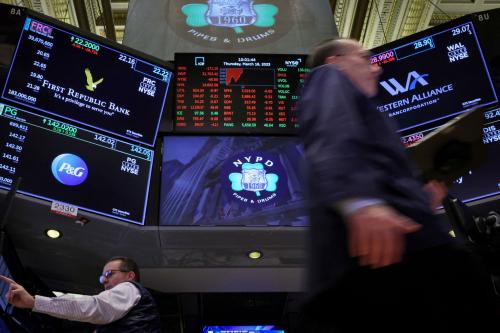This piece originally appeared in the Australian Financial Review.
The election of Donald Trump as the 45th President of the United States raises a number of issues for the global economy. It raises very particular issues for Australia which relies more than most countries on international trade and capital flows.
In evaluating the economic consequences for Australia, the first question is: will President Trump do what candidate Trump promised? Secondly, even if he wants to carry through with his policies will he be able to get the policies through the US Congress?
Donald Trump is more an Independent rather than a Republican. The views he expressed during the campaign on social, environmental and immigration policy are right wing. His views on trade policy and economic policy are left wing. To get much of his domestic policy implemented he needs the support of the US Congress which will be controlled by the Republican Party in both Houses. Like any US President, he will need to negotiate to get legislation through.
How plausible is it that his views outlined in his “Contract with America” and in various speeches will be implemented and what do they mean for Australia? Two of the most important economic issues for Australia are the macroeconomic policy shifts and international trade policy.
First his proposed tax reforms are large and wide ranging. He plans to reduce the personal income tax from 7 brackets to 3 and lower these tax rates. He plans to cut the corporate tax rate from 35% to 15% and give a reduced tax rate of 10% to corporation that repatriate funds held offshore back to America. He will abolish the inheritance tax. All up the Tax Policy Centre estimates the revenue loss to be around $9.5 trillion by 2026. This implies the debt to GDP ratio would rise by 80% by 2036. This is starting from a net debt to GDP ratio of 85% implies a near doubling of US government debt. Supply Siders argue that this will be self-financing. Reality is that even if it is in the long run, it will need to be financed by a large increase in the fiscal deficit and therefore debt in the short run. There are two consequences for bond markets. Long term real interest rates would be expected to rise sharply as the markets try to digest a large rise in debt. Short term interest rate would likely rise as the Fed backs out of the reliance on monetary policy and allows a substantial fiscal stimulus to raise demand. Higher demand will cause inflation to rise more quickly than it already is, further pushing up long term interest rates. The US dollar would rise sharply and foreign capital will flow in to finance ever rising US fiscal deficits.
President Trump has also promised to rebuild America through a large infrastructure program. Again this is a much needed reform and if done well, will like further boost the short and long run performance of the US economy. It is proposed to finance this through the private sector via tax incentives. This may not provide the type of infrastructure the US needs and will likely in the short run require debt financing.
Will a Republican Congress reverse years of opposition to raising the debt ceiling and allow a debt blowout of European proportions?
On international trade the risks are far greater. President Trump does not need Congress to withdraw from the TPP and to renegotiate NAFTA or even to levy a tariff on Chinese imports in retaliation for currency manipulation. A trade war cannot be ruled out if in fact the forces of protection dominate the Trump Presidency. How costly would this be? In a study for the World Bank, Andrew Stoeckel and I simulated a global trade war. We estimate that if the US levied a 40% tariff on all imports, US GDP would fall 1.2%. If all countries retaliated, US GDP would fall 5.2% and thus enter a deep recession. Australia’s GDP would fall by 5.6% in this trade war. If China then withdraws financing of the US budget deficit, the negative shock to the US is magnified even more. Ironically some of this capital would probably flow to Australia providing a GDP benefit. A major trade war is not a minor issue especially for a President who wants to rebuild America and who has significant personal financial interests in a healthy global economy. Self-interest and national interest versus narrow political interest suggests his original path will be avoided.
It is highly uncertain what a Trump Presidency means for the global economy until the actual policies are revealed. It is likely that there will be a switch towards fiscal stimulus and monetary rebalancing which is good for the US economy but how this is financed is critical. It is likely that government debt will rise and therefore long term interest rates will rise. This is bad for economies that are highly leveraged or sectors where there has been substantial mispricing of assets because assets will be repriced. Australia’s vulnerability is higher in this new world because Australia relies on foreign capital for financing domestic capital accumulation and gains a great deal from open international markets.
The worst outcome would be if Australia turned away from globalization towards a narrow nationalism which would compound negative shocks from offshore. Is it very clearly in the national interest to continue to focus on generating the gains from globalization and using the tax and transfer systems to more evenly spread the gains. Significantly, Australia is not the US in this respect.
It is also important, through reform of taxation and expenditures, to move the fiscal deficit into a more sustainable position that can withstand a significant rise in global interest rates and fall in global incomes in the worst case.
An inward focused Australia will quickly make clear the real costs of nurturing and unleashing the forces of populist nationalism.
The author did not receive financial support from any firm or person for this article or from any firm or person with a financial or political interest in this article. He is currently not an officer, director, or board member of any organization with an interest in this article.




Commentary
Op-edWhat would a Donald Trump trade war cost the Australian economy?
November 28, 2016